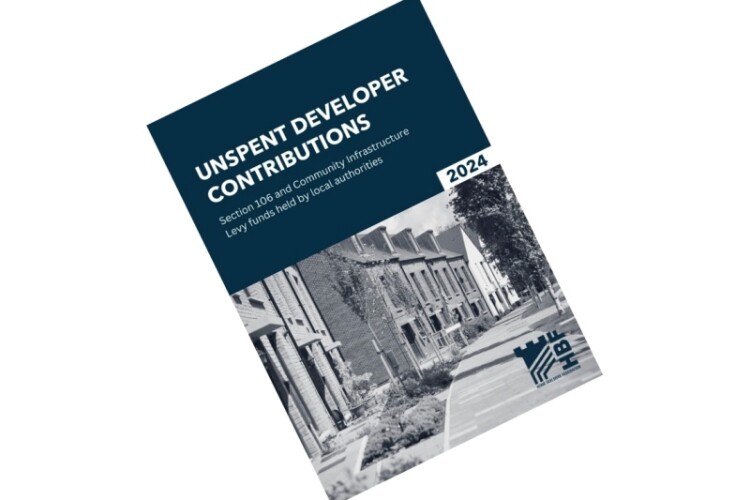New research by the Home Builders Federation (HBF) has found that more than a quarter of developer contributions are unused after more than five years
The HBF has calculated that local authorities in England and Wales are sitting on more than £8 billion of infrastructure payments made by developers, including more than £6bn from Section 106 agreements and almost £2bn raised through the Community Infrastructure Levy (CIL).
The research is based on a freedom of information (FOI) survey that received responses from 208 local authorities. The responses show that, on average, councils hold £19m in unspent Section 106 infrastructure contributions.
Developer contributions are paid to local authorities in return for planning permission. The money is supposed to go on affordable housing, infrastructure and amenities to improve the local area. The principal source of funding from builders comes from Section 106 agreements between the developer and the council detailing what will be provided or paid for, including new school buildings, GP surgeries, parks and transport improvements.
The HBF says that by, not spending the money, local residents are not seeing the benefits of local housing developments that they should, which fuels objections to any further developments.
As much as 26% – £1.6bn – of the unspent contributions have been held for more than five years.
The top 20 councils collectively hold around £2bn, with Oxfordshire County Council holding the largest amount of unspent Section 106 monies among respondents (£288m).
The estimated £8bn of unspent money includes:
- £817m in unspent affordable housing contributions that could support the delivery of around 11,000 affordable homes
- £1.1bn in highways and roads contributions across England and Wales
- £2bn in unspent education contributions that could support 126,000 new school places
- £873m in unspent social infrastructure contributions that could fund around 1,000 sports halls and 4,700 community games areas .
Local authorities in major cities with communities at the sharp end of the housing crisis hold the greatest sums of Section 106 monies allocated for affordable housing – with six of the top 10 councils with the largest affordable housing sums unspent being in London.

Section 106 agreements often stipulate that they can be returned to the payee if the sums have been held too long as projects are deemed unlikely to be delivered, meaning that communities do not receive all the benefits of development that local authorities have committed to.
The results of the FOI requests showed that 80 local authorities – around a third of all those who responded to this question – have returned Section 106 money to developers in the past five years, with a total of £20.6m being returned in total.
Further details are set out in the HBF report, Unspent Developer Contributions.
HBF is calling for greater transparency so that council infrastructure funding statements (IFS) state for how long money has been held and explain why infrastructure is delayed.
HBF chief executive Neil Jefferson said: “Each year developers contribute around £7bn to local authorities for the provision of local infrastructure, affordable housing and education, recreational and health facilities but some councils are increasingly failing to invest this cash into the services that so desperately need it.
“Investment in new housing delivery brings unrivalled economic and social benefits to communities but too many of these advantages are going unseen by local people. With the Government desperate to find money to invest in infrastructure to drive growth, it is nonsensical to have billions sat in council bank accounts.
"Furthermore, a lack of infrastructure provision is often cited as a reason to oppose development, yet this pipeline of billions of pounds of unspent infrastructure funding is too often underappreciated in debates about the impact of new development.
"Whilst appreciating the pressures and constraints on councils, we simply have to find a better way to ensure this money is spent promptly to benefit local communities, support local services and drive growth.”
The 20 local authorities who hold the most in unspent Section 106 contributions are:
- Oxfordshire County Council – £287.5m
- London Borough of Tower Hamlets – £166.8m
- Hampshire County Council – £148.3m
- West Sussex County Council – £142.5m
- Essex County Council – £140.4m
- Central Bedfordshire Council – £105m
- Kent County Council – £104.6m
- City of London Corporation – £94.8m
- Hertfordshire County Council – £92.6m
- Leicestershire County Council – £90.8m
- Cambridgeshire County Council – £89.8m
- Wokingham Borough Council – £86.4m
- Warwickshire County Council – £84.3m
- London Borough of Newham – £72m
- Milton Keynes City Council – £64.3m
- Gloucestershire County Council – £62m
- Royal Borough of Greenwich – £55m
- Royal Borough of Kensington & Chelsea – £54.3m
- Suffolk County Council – £51.9m
- South Gloucestershire Council – £51.3m.
Got a story? Email news@theconstructionindex.co.uk


